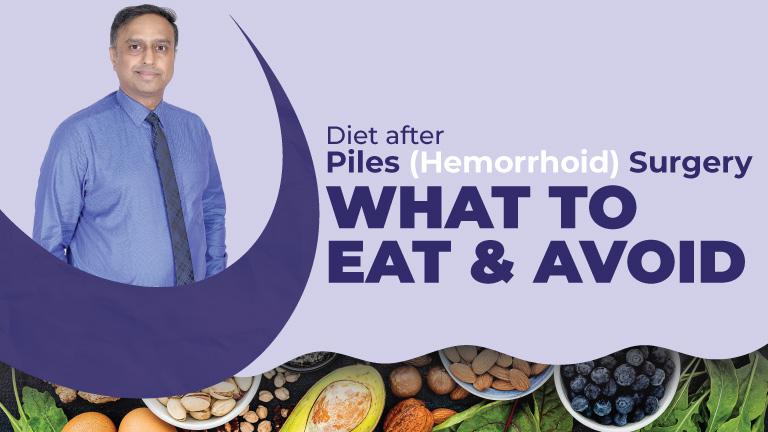As the recovery progresses after undergoing piles (hemorrhoid) surgery, transitioning to a healthy diet becomes pivotal in preventing constipation, and minimizing discomfort. Here’s a diet plan to follow after piles surgery, outlining foods to eat and avoid:
Importance of liquid diet and healthy diet after piles surgery
After undergoing piles surgery, the importance of both a liquid diet and a healthy diet cannot be overstated. In the immediate aftermath of the surgery, a liquid diet serves as a crucial bridge to recovery. It aids in minimizing strain on the healing surgical area, ensuring that the digestive system operates gently and without exacerbating discomfort. Additionally, liquid foods such as broths, soups, and smoothies offer soothing relief to the affected area, helping to alleviate inflammation and promote healing. Hydration is also paramount during this phase, and many liquid foods contain high water content, contributing to the body’s healing processes.
A diet rich in fiber plays a vital role in preventing constipation and straining, which are primary concerns post-surgery. By including whole grains, fruits, vegetables, and legumes in your post-pile surgery diet recipes, the digestive system can maintain regularity and function optimally. Moreover, a nutrient-rich diet provides the essential elements needed for tissue repair, wound healing, and overall immune function. The presence of anti-inflammatory foods further aids in reducing post-surgery inflammation and supports the body’s healing trajectory. This balanced and gentle approach to nutrition not only facilitates the recovery process but also lays the foundation for preventing the recurrence of hemorrhoids in the future.
What to Eat after Piles Surgery:
High-Fiber Foods: Include plenty of fiber to prevent constipation and promote regular bowel movements. Choose whole grains (oats, brown rice, whole wheat), fruits (apples, pears, berries), vegetables (leafy greens, broccoli, carrots), and legumes (beans, lentils).
Lean Proteins: Opt for lean protein sources to support healing and overall health. Include skinless poultry, fish, eggs, tofu, and low-fat dairy products.
Healthy Fats: Incorporate sources of healthy fats for inflammation control and general well-being. Examples include avocados, nuts, seeds, and olive oil.
Hydration: Drink plenty of water throughout the day to stay hydrated and keep stools soft. Herbal teas and diluted fruit juices are also good options.
Probiotic-Rich Foods: Probiotics such as yogurt promote gut health.
Vitamin-rich foods: Eat foods rich in vitamins A, C, and E, which support wound healing. Include citrus fruits, leafy greens, and colorful vegetables.
Small, Frequent Meals: Opt for smaller, balanced meals throughout the day to prevent overloading your digestive system.
What to Avoid after Piles Surgery:
Spicy Foods: Spicy foods can irritate the digestive tract and potentially cause discomfort.
Greasy or Fried Foods: These foods can be heavy and hard to digest, potentially leading to discomfort.
Processed Foods: Highly processed foods can lack nutrients and fiber while containing additives that may not be conducive to healing.
Caffeine and Carbonated Drinks: These beverages can sometimes contribute to gas and discomfort.
Alcohol: Alcohol can interfere with the healing process and should be avoided during recovery.
High-Sugar Foods: Foods high in added sugars can negatively impact overall health and might not provide the necessary nutrients for healing.
Hard-to-Digest Foods: Foods that are difficult to digest, such as very spicy foods or foods high in refined carbohydrates, should be avoided.
Excessive Dairy: Some people may experience temporary lactose intolerance after surgery, so limit dairy if you notice any digestive issues.
Sample Diet Plan to follow Post-Piles Surgery:
Breakfast:
- Oatmeal with sliced fruits and nuts
- Herbal tea or water
Lunch:
- Grilled chicken salad with mixed greens and olive oil dressing
- Whole wheat roll
Snack:
- Greek yogurt with berries
Dinner:
- Baked fish (like salmon) with steamed vegetables
- Quinoa or brown rice
Wrap-up Tips:
It’s imperative to consult a doctor before making any change in diet after piles surgery. A doctor’s guidance ensures that dietary modifications align with your specific medical condition, ensuring a safe and effective recovery. They can recommend the right balance of fiber, hydration, and nutrients, tailored to your needs. Additionally, a doctor’s expertise helps prevent potential complications, such as straining or irritation, while promoting healing. Consulting top pile surgeons such as Dr. Sunil Tibrewal can help prioritize medical advice to make informed and appropriate dietary choices during the recovery process.






